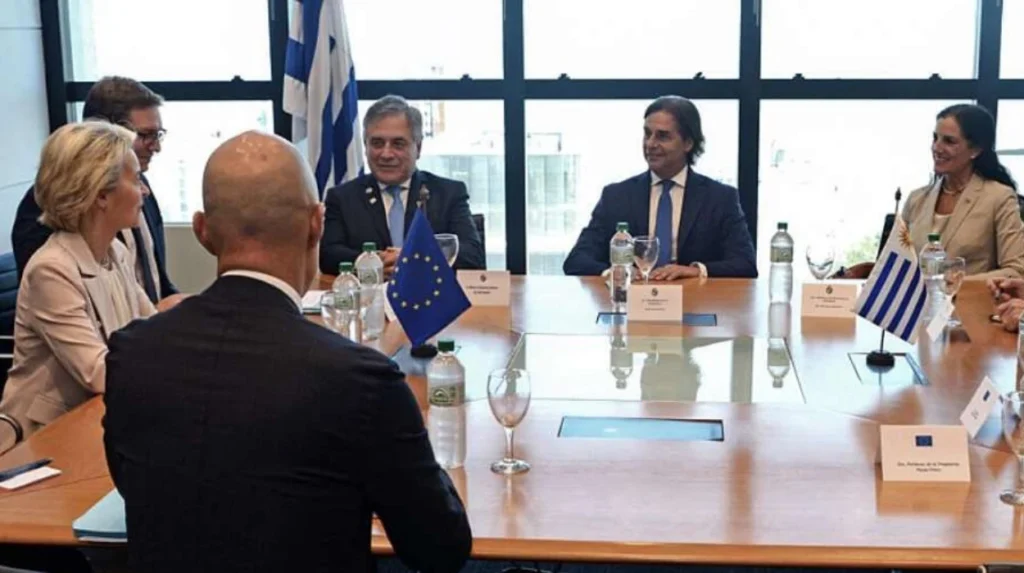Brussels, September 3, 2025 — The European Commission has officially endorsed the long-anticipated EU-Mercosur trade agreement, marking a significant move towards strengthening economic ties between the European Union and South America’s major trading bloc. This endorsement comes despite persistent reservations voiced by France, which has been vocal about its concerns regarding environmental and agricultural impacts related to the deal.
The Mercosur bloc comprises Argentina, Brazil, Paraguay, and Uruguay, representing a combined market of over 260 million people. The trade agreement, originally negotiated over two decades, aims to reduce tariffs and enhance market access for goods and services between these two economic regions. The deal has been praised for its potential to boost exports, create jobs, and foster closer political and economic cooperation.
The Commission’s Position and the Importance of the Deal
The European Commission’s endorsement reflects a commitment to advancing global trade cooperation while balancing environmental and social standards within trade agreements. In a formal statement, the Commission highlighted that “this agreement represents a strategic opportunity for the European Union to strengthen relations with one of the world’s largest and most dynamic economic regions.”
The deal promises increased export opportunities for European manufacturers and farmers, opening markets for products such as automobiles, machinery, chemicals, and beverages. For Mercosur countries, tariff reductions will improve access to the EU market for agricultural products, including beef, poultry, and sugar.
Economists and trade experts suggest that the agreement could increase the EU’s GDP by up to 0.5%, while Mercosur countries stand to gain even more due to improved European market access. Yet, the deal is not without controversy, particularly given the divergence of interests within the EU itself.
French Opposition: Environmental and Agricultural Concerns
France, representing a significant agricultural sector within the EU, remains a powerful skeptic of the Mercosur agreement. French officials and farming groups argue that the deal threatens sustainable farming practices and could lead to increased deforestation, especially in the Amazon rainforest, due to heightened demand for beef and soy.
French Agriculture Minister recently declared,
“We cannot accept a deal that compromises our environmental commitments and hurts our farmers. Agriculture is the backbone of our rural economy, and we must protect it from unfair competition.”
Environmental NGOs have echoed these concerns, stressing the risk that increased agricultural imports from Mercosur countries may undermine global efforts to combat climate change and biodiversity loss. They warn that the agreement must be accompanied by robust monitoring mechanisms to ensure compliance with environmental norms and zero tolerance for deforestation-linked products.
Balancing Economic Opportunity with Environmental Responsibility
In response to these concerns, the European Commission has underscored its commitment to upholding the EU’s high standards on sustainability and social issues within the framework of the Mercosur deal. It has proposed including legally binding sustainability chapters that require Mercosur countries to adhere to environmental regulations and labor rights commitments.
The Commission stressed,
“Trade agreements must go hand in hand with strong environmental and social commitments. We will ensure that this deal enforces compliance with the Paris Agreement and respects indigenous peoples’ rights.”
However, critics remain wary of how enforcement mechanisms will operate in practice. The challenge lies in ensuring that environmental provisions are not only included in text but are actively monitored and implemented.
Political Dynamics within the European Union
The endorsement by the European Commission does not equate to immediate ratification of the deal by the European Parliament or member states. Several EU countries, led by France but also including Austria and Ireland, have expressed their desire for further revisions or specific guarantees before giving their full approval.
The French government, while acknowledging the Commission’s endorsement, continues to call for safeguards that would protect French farmers and the environment. French President has remarked,
“We support responsible trade, but it cannot come at the cost of our values and ecosystems.”
Diplomats in Brussels observe that the Mercosur deal has become a litmus test for the EU’s ability to negotiate trade agreements that advance economic interests without sacrificing sustainability commitments. The divided positions among member states signal a complex ratification process ahead.
Reactions from Mercosur Countries
Representatives from Mercosur member states have welcomed the European Commission’s endorsement as a vital step to unlocking growth opportunities. Brazilian officials expressed optimism that the agreement would boost exports and encourage investment.
The Brazilian Minister of Economy stated,
“This agreement is a recognition of Mercosur’s importance in the global economy and a chance to deepen our partnership with Europe, promoting development and industrialization in our region.”
Similarly, Argentine and Uruguayan leaders foresee expanded market access as instrumental to their economic recovery efforts following recent domestic challenges.
The Next Steps: Ratification Challenges and Future Prospects
Despite the Commission’s endorsement, the Mercosur deal still faces significant hurdles. It needs approval from the European Parliament and the national legislatures of all 27 EU member states, a process that could take months or even years given the sensitivity of the issues involved.
Trade unions and civil society groups plan to intensify public campaigns both for and against the deal, raising questions around labor standards, environmental impact, and the broader direction of globalization.
Observers note that the Commission’s decision underscores a broader geopolitical goal: strengthening transatlantic ties and counterbalancing rising protectionism in other parts of the world. By integrating major markets from two continents, the EU and Mercosur seek to promote an open, rules-based international trading system.
Navigating Divergent Interests in EU-Mercosur Relations
The European Commission’s endorsement of the Mercosur trade agreement signals a critical juncture in EU-Latin American relations, highlighting the tension between economic ambitions and sustainability priorities. While the deal promises significant economic benefits, particularly in expanding market access and fostering trade growth, the controversy surrounding environmental standards and agricultural competitiveness reveals the complex realities of modern trade policymaking.
France’s reservations represent a wider challenge faced by the EU: how to reconcile diverse domestic interests while presenting a united stance in global trade negotiations. The coming months will be crucial as the deal moves toward ratification, with the potential to either strengthen or strain the partnership between the European Union and Mercosur countries.
As the global trading landscape evolves, the EU-Mercosur deal may ultimately serve as a benchmark for how large economic blocs address the intertwined challenges of economic growth, environmental stewardship, and social equity in future trade agreements.







